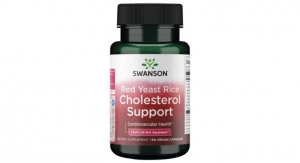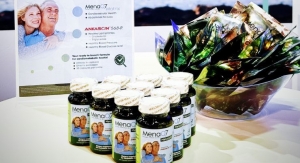By Lisa Olivo, Associate Editor06.01.18
Cardiovascular disease (CVD) is the world’s leading killer, according to the World Health Organization (WHO), claiming 17.7 million lives each year; an estimated 80% of CVD deaths are attributed to heart attack and stroke. This global crisis is on the rise, driven largely by tobacco use, overconsumption of salty foods, and high blood pressure.
Clearly, lifestyle factors are a significant contributor to heart health issues, and more consumers are recognizing the role nutrition can play in supporting general wellness. A recent study conducted by HealthFocus International found that 51% of consumers surveyed were extremely or very concerned about cardiovascular health, and 41% had similar feelings related to high cholesterol, noted Pam Stauffer, global marketing programs manager for Cargill, Minneapolis, MN. “For many consumers, that concern translates into interest in purchasing products with heart health benefits.”
Regardless of age or gender, this study found participants were actively seeking out dietary measures to help reduce their risk of heart disease, including functional foods and beverages aimed at cholesterol reduction, Ms. Stauffer added.
As more people seek out nutritional products to curtail this pressing health issue, data from Nutrition Business Journal has indicated functional ingredients supporting heart health could earn more than $3 billion by 2020. This potential means “companies in the supplement space will have opportunities like never before,” said Andreas Berg Storsve, PhD, director of R&D for Norway-based Aker BioMarine. “There is no question that innovation in the heart health category will help drive new delivery formats, combination products, and much more.” However, he suggested consumer education is key for the category’s overall success.
Broad Impact
With heart disease on the rise, nutritional products that support the cardiovascular system will become more important.
As part of a 2017 survey conducted by the Natural Marketing Institute (NMI) and commissioned by Lonza Consumer Health & Nutrition, 2,000 U.S. consumers were questioned about their supplement preferences. The survey found 821 of the 2,000 participants (41%) said they utilize dietary supplements to support heart health, explained June Lin, head of global marketing for Lonza Consumer Health & Nutrition, Morristown, NJ.
According to the NMI data, there is little difference between how the aging baby boomer population manages heart health, compared to millennials. Ms. Lin said that “37% of the baby boomer generation—those born between the mid-1940s and mid-1960s—state they use products with targeted heart health benefits, with this figure only slightly lower (34%) among millennials who were born between the 1980s and 2000s.”
Ms. Lin suggested this broad demographic interest among informed healthcare consumers seeking a preventive approach to heart health will be a huge opportunity for companies in the dietary supplement market. She underscored mounting demand for targeted products, especially in the heart health category. “Consumers want proven, science-backed ingredients, in a convenient format, which is why capsules are particularly popular. The survey found that 41% of supplement users prefer capsules, compared to tablets (36%).”
Once considered an issue primarily of concern for men, women are also seeing the impact of CVD. “Heart disease is gender blind,” stated Ms. Stauffer. “The CDC reports that in the U.S., heart disease is the leading cause of death for both men and women. Contrary to popular belief, around the same number of men and women die each year of heart disease.”
While it can affect people at all stages of life, the risk of CVD is more prominent in the aging population. “For men, the risks begin to rise around age 45, when one out of every 100 men develops signs of heart disease,” explained Ms. Stauffer, citing data from the Society of Cardiovascular Angiography and Interventions (SCAI). “By age 55, that number has doubled, and it continues to increase until, by age 85, about seven out of every 100 men have cardiovascular disease.” CVD also increases as women age, she added, but on average the trend begins about 10 years later.
Despite the fact that both men and women are at risk for CVD, more men reported taking dietary supplements specifically for heart health than women. In the Council for Responsible Nutrition’s 2017 Annual Survey on Dietary Supplements over a quarter (26%) of male supplement users said they took dietary supplements for heart health.
Kate Quackenbush, communications director at NattoPharma USA, Inc., Edison, NJ, pointed to chronic deficiency of vitamin K2, which plays a critical role in calcium absorption, as a leading contributor to cardiovascular disease. “When calcium is left unattended in the body, it does not bind to the bone mineral matrix to support skeletal health,” she explained. “Rather, unattended calcium will deposit in arteries, blood vessels, and soft tissues, causing them to become stiff and inflexible, reducing the free flow of blood through the body.”
This arterial calcification occurs gradually over time. “Whether you are a man or woman, waiting until one reaches their senior years to address the damaging effects of calcification can prove futile. Rather, we need to consider our health as a whole, and try to provide the nutrient support that will let us enter our senior years in the best possible health,” said Ms. Quackenbush. She stressed that laying the foundation for bone and cardiovascular health needs to begin as early as possible.
Inactivity and obesity are also key risk factors for CVD, which are often the result of nutritional and behavioral choices made over a lifetime, according to Dr. Storsve of Aker BioMarine. While those in middle age are more acutely impacted by the consequences of these issues, an increasing number of children are now at risk for CVD. “A growing number of young people are affected by heart disease, and this is likely related to a rise in childhood obesity and diabetes,” noted Dr. Storsve. “The good news is that nutritional and lifestyle changes can reduce the risk of heart disease, and it is therefore necessary to take action as early as possible.”
Nutrition’s Role in Prevention
Diets including too much salt and saturated fat have contributed to the rise in cardiovascular disease, leading to concern on an international level. In an attempt to combat this issue, the WHO developed a heart health initiative in 2016 aimed at raising consumer awareness for this global health crisis. The “Global Hearts Initiative” strives to reduce salt in foods, detect and treat people at high risk for CVD, and strengthen primary healthcare level services, among other initiatives.
In addition to reducing unhealthy additives, experts in the natural products industry are urging consumers to seek out functional nutritional products.
Senior analyst for London-based Euromonitor International Maria Mascaraque suggested “many manufacturers have focused on using ingredients with a heart health benefit to fortify food and beverages, such as omega-3 fatty acids or plant sterols, as well as foods naturally rich in heart health ingredients, such as flavanols and/or tocopherols.” She also pointed to the rise of broader health indications such as metabolic syndrome or fatty liver, which she said “remain a major untapped opportunity with few ready-to-market solutions to date in the foods and drinks space.”
A wide range of nutritional ingredients can benefit cardiovascular wellness, many of which boast approved health claims, she said. However, Ms. Mascaraque noted a clear consumer preference toward foods and beverages that are naturally beneficial for the heart. “As there is a strong movement towards functional foods that naturally contain healthy ingredients instead of those artificially fortified, manufacturers should focus on this to succeed.” For example, she said walnuts naturally contain antioxidants and can utilize the health claim “contribute to the improvement of the elasticity of blood vessels” in the EU. Other trending ingredients that are naturally heart-healthy include olive oil, omega-3s, algae, vitamins, and minerals.
Plant Sterols
Plant sterols (phytosterols) have been clinically shown to lower cholesterol, explained Alex Eapen, principal scientist, Cargill, and benefit from several validated health claims. “The U.S. Food and Drug Administration (FDA) allows a health claim noting the relationship between plant sterol esters and plant stanol esters and reduced risk of coronary heart disease (CHD),” he explained. “In its review, the FDA said: ‘…there is significant scientific agreement that diets that include plant sterol esters and plant stanol esters may reduce the risk of CHD.’”
In addition, Health Canada concluded that acceptable scientific evidence exists to support claims related to the relationship between consuming foods enriched with plant sterols and lower blood cholesterol levels. “In its Summary of Assessment, Health Canada noted: ‘consumption of these foods results in the lowering of total blood cholesterol as well as LDL-cholesterol levels, while having no detrimental effect on HDL-cholesterol levels, resulting in overall improvements in the blood lipid profile,’” Mr. Eapen noted.
Furthermore, researchers have analyzed plant sterols’ potential impact on healthcare savings, both in the U.S. and Europe. “In one report, researchers at Frost & Sullivan [and funded by CRN] found that between 2013 and 2020, nearly 2.3 million medical events could be avoided in U.S. adults over 55 with coronary heart disease through supplementation of plant sterols at preventive intake levels,” cited Mr. Eapen. Meanwhile, in a separate 2017 report commissioned by Food Supplements Europe, “Frost & Sullivan found that daily consumption of 1.7 g of plant sterols by adults over 55 in the EU with severe hypercholesterolemia could provide healthcare savings of €5.3 billion per year and prevent more than 170,000 hospitalizations.” Hypercholesterolemia is a condition characterized by high levels of cholesterol in the blood.
As a result of its strong regulatory and scientific backing, plant sterols are also recommended by the National Cholesterol Education Program (NCEP) of the National Heart, Lung and Blood Institute of the National Institutes of Health, he added.
Omega-3s
EPA (eicosapentaenoic acid) and DHA (docosahexaenoic acid) omega-3s in fish oil are among the most studied nutrients in the world, according to the Global Organization for EPA and DHA Omega-3s (GOED), with a growing body of clinical research linking them to benefits for cardiovascular health.
“A recent study [Atherosclerosis, 2017], which systematically analyzed 10 population studies around the globe (included more than 27,000 subjects) reported that individuals who had higher levels of EPA and DHA omega-3 circulating in their blood, that is 8% or greater, had a 30% lower risk of death from a fatal heart attack, compared to those with EPA and DHA omega-3 levels of 4% or less,” noted Gretchen Vannice, MS, RDN, head of global nutrition education, AlaskOmega, Coshocton, OH.
Alarmingly, Americans fall far below this desirable range; the average blood level of EPA and DHA omega-3 in the U.S. is about 4%. However, with supplementation these numbers can be improved in a matter of weeks, Ms. Vannice said. To increase EPA and DHA omega-3 in blood by 4% to meet the desired 8% range, supplement users would need to take just 1 gram daily of EPA+DHA for 24 weeks; 2 grams per day for 12 weeks; or 3 grams per day for just 8 weeks (Improving Omega-3 Nutrition: A New Paradigm for Health. A Guide for Health Professionals. Better Health Books, 2014).
On average, the current intake of EPA and DHA from diet alone among Americans is roughly 40 mg in children and 100 mg in adults, according to the USDA National Health and Nutrition Examination Survey (NHANES) 2013-2014. However, Ms. Vannice noted there is no Reference Daily Intake (RDI) for EPA and DHA omega-3s currently in the U.S. “National health organizations (e.g., National Lipid Association, American Heart Association) advise that all Americans eat fish two or more times a week for primary and secondary prevention of heart disease,” she explained. “The purpose behind this recommendation is to increase intake of EPA and DHA omega-3s, since these nutrients naturally occur in fish and marine sources. Consuming fish two or more times a week provides about 250-500 mg EPA and DHA per day. Between 500 and 1,000 mg EPA and DHA omega-3 is recommended for individuals at risk for heart disease.”
Dr. Storsve with Aker BioMarine suggested the long-chain omega-3s EPA and DHA found in krill are especially important for heart health as they modify blood triglyceride levels, HDL cholesterol, plaque development, heart rate, heart muscle function, and reduce blood pressure.
“Inflammation is also a known risk factor for heart disease, and the anti-inflammatory properties of DHA and EPA can help balance the body’s level of inflammation [Biochimica et Biophysica Acta, 2015],” he noted. “Furthermore, it has been found that an increase from 3.6% to 6.9% in the relative amount of EPA and DHA in red blood cell membranes (termed the Omega-3 Index) is associated with a significant reduction in the risk for sudden cardiac death [New England Journal of Medicine, 2002]. Krill oil supplementation is a very efficient way to increase the Omega-3 Index.”
Krill oil, he added, is an increasingly popular omega-3 option, providing EPA and DHA mainly in the form of phospholipids. “Krill’s omega-3s are carried directly into the blood via the phospholipids, thereby raising one’s Omega-3 Index more efficiently as compared to other omega-3 oils that are delivered as triglycerides and follow different paths in the body. Krill also contains the essential nutrient choline, which is crucial for cell structure and signalling, lipid transport, homocysteine reductions—elevated levels of homocysteine are associated with early heart disease)—as well as astaxanthin, a natural antioxidant that keeps omega-3s naturally fresh and stable.”
Ms. Lin with Lonza Consumer Health & Nutrition referred to the company’s survey with NMI, which found 59% of consumers take krill oil supplements for specific heart health benefits. However, she noted that because krill oil contains a high concentration of phospholipids, this marine oil can often present manufacturing challenges in traditional dosage forms. “To overcome this issue, Lonza Consumer Health & Nutrition has developed Licaps liquid-filled capsules, a hermetically bonded dosage form that can help mask the strong taste and odor of krill oil,” she said. This capsule format can be applied to numerous omega-3 formulas, she added. “With omega-3s, which remains a top supplement among consumers seeking heart health benefits (48%), the Licaps capsule technology is effective in protecting, and ensuring stability of, these highly concentrated oils.”
CoQ10
Coenzyme Q10 (CoQ10) is a naturally occurring antioxidant in the body that is used to create energy. Scott Steinford, executive director of the CoQ10 Association described CoQ10 as a cofactor in the electron-transport chain, which is involved in the synthesis of adenosine triphosphate (ATP).
“The heart is the body’s most energy-hungry (ATP-hungry) organ. That makes sense since the heart muscle never rests. It needs ATP constantly,” he explained. He cautioned that low CoQ10 levels translate into an energy-starved heart. “The issue is that so much of what Americans do diminishes the heart’s performance, whether it’s following a poor diet and making other unhealthy lifestyle choices—including what pharmaceuticals to take.”
Pharmaceutical drugs such as statins (for example Astra’s Crestor, or Pfizer’s Lipitor) are routinely used to reduce levels of fats such as triglycerides and cholesterol in the blood. In the U.S., an estimated 11 million people are utilizing a statin, according to NHANES data. Though a powerful tool in reducing cholesterol, statins do come with side effects—one of which is CoQ10 deficiency. Aging also naturally depletes the body’s stores of CoQ10. Symptoms of low CoQ10 may include high blood pressure, muscle weakness and fatigue, and even more serious issues such as heart failure and chest pain.
Deanne Dolnick, science director, TR Nutritionals, Alpharetta, GA, suggested CoQ10 was among the most popular supplements to support heart health. “It is naturally produced in the body and decreases as we age. Although found in food, most people do not ingest enough through diet alone. CoQ10 is essential for the health of virtually all human tissues and organs. It is one of the most significant lipid antioxidants, which prevents the generation of free radicals and modifications of proteins, lipids, and DNA.”
Emerging research validates CoQ10’s benefits for heart health, Mr. Steinford said. For example, he pointed to the Q-SYMBIO study, which involved 420 patients with moderate to severe heart failure that lasted two years. “In a double-blind placebo-controlled trial, the subjects were assigned CoQ10 supplementation (100 mg, three times daily) or a placebo. While there were no changes in short-term endpoints, long-term benefits were abundant.” Findings demonstrated a significant reduction in the incidence of major adverse cardiovascular events in the CoQ10 group—15% in the CoQ10 group versus 26% in the placebo group. “There was also a significant reduction in overall mortality,” added Mr. Steinford, with “9% in the CoQ10 group versus 16% in the placebo group and in cardiovascular mortality and heart failure hospitalizations [Journal of the American College of Cardiology, 2014].”
Discussing the study, lead researcher SA Mortensen said, “CoQ10 is the first medication to improve survival in chronic heart failure since ACE inhibitors and beta blockers more than a decade ago and should be added to standard heart failure therapy.” In addition, the researcher noted that CoQ10 “is a natural and safe substance, corrects a deficiency in the body, and blocks the vicious metabolic cycle in chronic heart failure called the energy-starved heart.”
In a 2013 a meta-analysis published in the American Journal of Clinical Nutrition, 13 out of 120 potentially relevant studies were selected to determine CoQ10’s effects on congestive heart failure (CHF). “The analysis focused on primary indicators of CHF, namely ejection fraction (EF) and New York Heart Association (NYHA) functional classification in CHF patients,” explained Mr. Steinford. “The meta-analysis found significant improvement in EF for subjects receiving CoQ10 supplementation compared to control groups. Positive effects were likely due to CoQ10’s involvement in ATP synthesis in heart muscle.”
Vitamins & Micronutrients
New research has supported the use of vitamin K2 in heart health, with one study indicating its mechanism of action was to help inhibit the stiffening of arterial walls and the development of arterial plaques. “Vitamin K2 activates proteins already in the body that help the body properly regulate calcium transport—osteocalcin for bone health, and Matrix Gla Protein (MGP) for cardiovascular health,” explained Ms. Quackenbush with NattoPharma. “By activating these proteins, vitamin K2 simultaneously supports both bone and cardiovascular health.”
The three-year cardiovascular study, which was published in 2015 in Thrombosis and Haemostasis backed K2s benefits for the prevention of arterial stiffening. “Scientists performed a double-blind, randomized, intervention study of 244 postmenopausal women given either 180 mcg of Vitamin K2 as MK-7 (as MenaQ7 by NattoPharma) or a placebo daily for three years,” she explained. “This first intervention trial on MK-7 supplements and cardiovascular endpoints showed that three-year supplementation with a daily, nutritional dose of MenaQ7 was enough to actually decrease arterial stiffness in healthy post-menopausal women.”
Another one-year cardiovascular study, which was just completed and submitted for publication, has indicated that a daily nutritional dose of MenaQ7 Vitamin K2 as MK-7 improved vascular health in both male and female healthy participants.
“Completed by the expert researchers at VitaK, the placebo-controlled randomized clinical trial demonstrated the benefits of 180 µg/day of MK-7 on vascular health and body composition in 243 healthy subjects (77 men and 166 women) with a poor vitamin K status, as measured by dp-ucMGP (inactive Matrix Gla Protein, a marker for cardiovascular health),” explained Ms. Quackenbush. “In the total group, vitamin K2 as MK-7 decreased dp-ucMGP (inactive MGP) significantly compared to placebo after one year. The researchers conclude that one-year supplementation of MK-7 tended to improve vascular health in men and women with a poor vitamin K status.” She noted that this beneficial effect was more pronounced in post-menopausal women and in subjects with a high stiffness index.
Among scientifically-substantiated heart healthy ingredients, vitamin E palm tocotrienol complex has also emerged as a critical phytonutrient. ExcelVite’s EVNol SupraBio—a patented and bio-enhanced natural full spectrum tocotrienol complex—is a clinically-researched palm tocotrienol complex, according to Bryan See, business development manager for ExcelVite Inc., Edison, NJ. With more than 17 peer-reviewed published human studies in the past 10 years, covering heart health, as well as brain, liver, and skin health, Mr. See said EVNol SupraBio is used by leading practitioners’ brands such as Xymogen, Allergy Research, Metagenics, Life Extension, etc., and various branded dietary supplements.
Discussing the vitamin E palm tocotrienol complex’s scientific backing, Mr. See pointed to a 2007 study that included 28 subjects with mild hypercholesterolemia (≥ 200mg/dL to < 300mg/dL) and one additional cardiovascular risk factor who were supplemented with 50 mg d-mixed-tocotrienol (EVNol SupraBio) daily for four weeks. Subjects “had significantly lower total cholesterol and LDL-choles terol levels from baseline, compared to 16 subjects who took the conventional vitamin E alpha-tocopherol (at 500 mg per day) (Ajuluchukwu JN, et al., 2007),” he said.
In another study, 32 healthy subjects with hypercholesterolemia (≥ 240mg/dL) were equally divided to receive either 300 mg/day of d-mixed-tocotrienol softgels (containing EVNol SupraBio or placebo softgels (300 mg, soybean oil) for a period of six months.
“When compared to baseline, the d-mixed-tocotrienol supplemented group demonstrated an 8.9% decrease in serum total cholesterol, and 12.8% in LDL-cholesterol levels after four months,” said Mr. See. “Continuous reduction was recorded until the end of the six-month study period with a reduction of 10.8% and 17.3% respectively (Yuen KH, et al., 2011).”
EVNol SupraBio was also found to improve arterial compliance and reduced arterial stiffness in a randomized, controlled human study. “Arterial stiffness is an independent risk factor of cardiovascular disease in both healthy and diseased human subjects,” explained Mr. See. “Increased arterial stiffness means decreased arterial compliance.” After two months of oral supplementation EVNol SupraBio was found to reduce arterial stiffness in healthy adults.
An additional 2015 study found the ingredient supports healthy blood pressure. “In a randomized, double-blind, placebo-control trial conducted in Malaysia, 70 adults with metabolic syndrome aged 20-60 years-old were randomized to receive either EVNol SupraBio (400 mg/day in a softgel dosage form) or placebo for 16 weeks. After the supplementation period, subjects in the EVNol SupraBio group showed signification reductions in diastolic blood pressure compared to baseline. In addition, improvement in lipid profile and reductions in IL-6 and TNF-alpha inflammatory markers were also recorded (Heng KS, et al., 2015).”
Ms. Dolnick with TR Nutritionals said methylcobalamin is an essential micronutrient that can support cardiovascular health. “While many companies elect to use cyanocobalamin in their formulations due to its lower cost, the body must first reduce cyanocobalamin to methylcobalamin for absorption into the cells,” she noted.
“This reduction process utilizes the key antioxidant glutathione, which is essential for many other oxidation-reduction reactions and, along with methylcobalamin, assists in lowering high homocysteine levels, a known contributor to heart disease.” She said methylcobalamin is utilized without conversion and therefore does not deplete glutathione or methyl groups. “Low levels of glutathione have been linked to heart disease.”
Certified Nutraceuticals, Pauma Valley, CA, offers Olea25 25% hydroxytyrosol—an olive leaf extract which aims to support cardiovascular wellness. The formula provides strong antioxidant and anti-inflammatory support, benefiting LDL oxidation, offering anti-thrombotic properties, and reducing inflammatory biomarkers, the company said.
A health claim from the European Food Safety Authority (EFSA) supports the benefits of hydroxytyrosol supplements, validating it for benefits for cardiovascular and antioxidant support. Additionally, hydroxytyrosol’s polyphenolic compounds are linked to the protection of blood lipids from oxidative damage. Clinical studies reveal that these polyphenols taken in a low daily dose for a period of three weeks resulted in the reduction of damaged low-density lipoproteins.
Formulating for Success
In response to the mounting need for cardiovascular support, product manufacturers are developing unique offerings to help consumers cultivate lifelong heart health. However, the creation of functional foods and beverages positioned for heart support can be challenging, according to Ms. Mascaraque of Euromonitor.
“Natural ingredients and clean labels are key as consumers are moving away from heavily processed foods and drinks,” she explained. “Convenience is also key as there is an increasing number of consumers looking for healthy and convenient products for on-the-go consumption.”
Ms. Mascaraque outlined several key considerations to factor in when developing a new food or beverage in the heart health space:
Education: “There is a need to raise consumers’ awareness of the importance of modifiable risk factors in cardiovascular diseases,” said Ms. Mascaraque. “In many cases they are related, at least partly, to lifestyle and the diet, and thus can be modified. To address this, multipronged efforts are needed, including consumers’ education as a key component.”
Naturally functional: Ms. Mascaraque highlighted an increasing desire for natural ingredients. “Vegetables as the core ingredient and plant-sourced ingredients are in hot demand, as they are perceived as natural in origin and environmentally sustainable, as well as healthier,” she noted. “This leads to a movement towards using natural sources of functional ingredients with cardiovascular health benefits.”
Health claims to support trust: “Rising investment in functional food and drinks, as well as ensuring companies have the necessary internal expertise, will lead to greater innovation in product positioning for cardiovascular health,” Ms. Mascaraque suggested. She indicated that multinationals are in a strong position to support these endeavors, due to their resources and existing networks.
“Manufacturers should consider new ingredients with a natural perception and work on strong science for future health claims approvals,” she said. In fact, Ms. Mascaraque suggested utilizing regulation enables the use of stronger product claims, and plays to consumer trust, which she called “a huge advantage.”
She urged companies to “take advantage of ingredients with current approved health claims, paying attention to natural sources in the amount needed to be able to claim a health benefit.” In the EU, for example, structure-function claims (Article 13) are more consumer-friendly than claims related to risk reduction (Article 14), which she said are “perceived as more alarming” by some consumers.
Connect with the consumer: “Consumers must be informed about the benefits of the functional ingredients used, which often stems from cultural awareness,” stressed Ms. Mascaraque. “In any case, manufacturers are increasingly investing in education programs and apps to address this and engage with the consumer from a more personal perspective, by highlighting the nutritional value of the product or its usage in traditional medicine.”
Category Predictions
As long as cardiovascular disease remains the leading cause of death in the U.S. and around the world, Ms. Vannice said there will be demand for nutritional solutions. Additionally, she suggested the rise in issues related to blood sugar management could spur growth in the category. “As research continues to document that the majority of people with type 2 diabetes die from heart disease, the demand will continue,” she said.
While heart health is a top-selling category in the dietary supplement market, Ms. Dolnick lamented the difficulty in marketing products with this positioning. “The problem lies in that the marketers are limited by what they can write on the label or in their advertising,” she stated. “The consumers read the labels/advertising and want to see a specific claim (i.e., lowers cholesterol or lowers blood pressure). So, unless a healthcare professional has specifically recommended a product or the consumer has done their own research, these products are a tough sell. They always have been.”
Mr. See pointed to consumers’ increasingly hectic lifestyles as a key factor leading them to convenient nutritional products offering heart support. “As much as most consumers would like to prepare their own meals to eat healthily, it is not always possible to do so. As such, nutritional supplements, and conveniently prepared food and beverages that meet clean label trends that also carry heart health benefits will continue to be welcomed.”
Evolving research around the causes of the world’s cardiovascular decline will also continue to spur innovation in the nutraceuticals space, said Jim Lugo, chief scientific officer, Lonza Consumer Health & Nutrition. “Over the coming decade, there is likely to be a concerted effort by cardiologists and biological scientists to better understand at the molecular level how a ‘healthy diet,’ combined with exercise, results in the metabolic changes that ultimately reduce cardiovascular disease. Once we understand metabolic changes at very precise levels, we anticipate that an entirely new range of ingredients, which can induce the same beneficial changes, will emerge on the market.”
The Dietary Inflammatory Index will be crucial to this, he added.
“Diets that are anti-inflammatory by nature appear to reduce the incidence of myocardial infarction significantly, with ingredients such as saffron, thyme, and oregano having the greatest impact on cardiovascular health. Future research and development will focus on how best to deliver the benefits of these ingredients to the consumer—something we expect to see achieved by combining more than one ingredient into a single supplement.”
Clearly, lifestyle factors are a significant contributor to heart health issues, and more consumers are recognizing the role nutrition can play in supporting general wellness. A recent study conducted by HealthFocus International found that 51% of consumers surveyed were extremely or very concerned about cardiovascular health, and 41% had similar feelings related to high cholesterol, noted Pam Stauffer, global marketing programs manager for Cargill, Minneapolis, MN. “For many consumers, that concern translates into interest in purchasing products with heart health benefits.”
Regardless of age or gender, this study found participants were actively seeking out dietary measures to help reduce their risk of heart disease, including functional foods and beverages aimed at cholesterol reduction, Ms. Stauffer added.
As more people seek out nutritional products to curtail this pressing health issue, data from Nutrition Business Journal has indicated functional ingredients supporting heart health could earn more than $3 billion by 2020. This potential means “companies in the supplement space will have opportunities like never before,” said Andreas Berg Storsve, PhD, director of R&D for Norway-based Aker BioMarine. “There is no question that innovation in the heart health category will help drive new delivery formats, combination products, and much more.” However, he suggested consumer education is key for the category’s overall success.
Broad Impact
With heart disease on the rise, nutritional products that support the cardiovascular system will become more important.
As part of a 2017 survey conducted by the Natural Marketing Institute (NMI) and commissioned by Lonza Consumer Health & Nutrition, 2,000 U.S. consumers were questioned about their supplement preferences. The survey found 821 of the 2,000 participants (41%) said they utilize dietary supplements to support heart health, explained June Lin, head of global marketing for Lonza Consumer Health & Nutrition, Morristown, NJ.
According to the NMI data, there is little difference between how the aging baby boomer population manages heart health, compared to millennials. Ms. Lin said that “37% of the baby boomer generation—those born between the mid-1940s and mid-1960s—state they use products with targeted heart health benefits, with this figure only slightly lower (34%) among millennials who were born between the 1980s and 2000s.”
Ms. Lin suggested this broad demographic interest among informed healthcare consumers seeking a preventive approach to heart health will be a huge opportunity for companies in the dietary supplement market. She underscored mounting demand for targeted products, especially in the heart health category. “Consumers want proven, science-backed ingredients, in a convenient format, which is why capsules are particularly popular. The survey found that 41% of supplement users prefer capsules, compared to tablets (36%).”
Once considered an issue primarily of concern for men, women are also seeing the impact of CVD. “Heart disease is gender blind,” stated Ms. Stauffer. “The CDC reports that in the U.S., heart disease is the leading cause of death for both men and women. Contrary to popular belief, around the same number of men and women die each year of heart disease.”
While it can affect people at all stages of life, the risk of CVD is more prominent in the aging population. “For men, the risks begin to rise around age 45, when one out of every 100 men develops signs of heart disease,” explained Ms. Stauffer, citing data from the Society of Cardiovascular Angiography and Interventions (SCAI). “By age 55, that number has doubled, and it continues to increase until, by age 85, about seven out of every 100 men have cardiovascular disease.” CVD also increases as women age, she added, but on average the trend begins about 10 years later.
Despite the fact that both men and women are at risk for CVD, more men reported taking dietary supplements specifically for heart health than women. In the Council for Responsible Nutrition’s 2017 Annual Survey on Dietary Supplements over a quarter (26%) of male supplement users said they took dietary supplements for heart health.
Kate Quackenbush, communications director at NattoPharma USA, Inc., Edison, NJ, pointed to chronic deficiency of vitamin K2, which plays a critical role in calcium absorption, as a leading contributor to cardiovascular disease. “When calcium is left unattended in the body, it does not bind to the bone mineral matrix to support skeletal health,” she explained. “Rather, unattended calcium will deposit in arteries, blood vessels, and soft tissues, causing them to become stiff and inflexible, reducing the free flow of blood through the body.”
This arterial calcification occurs gradually over time. “Whether you are a man or woman, waiting until one reaches their senior years to address the damaging effects of calcification can prove futile. Rather, we need to consider our health as a whole, and try to provide the nutrient support that will let us enter our senior years in the best possible health,” said Ms. Quackenbush. She stressed that laying the foundation for bone and cardiovascular health needs to begin as early as possible.
Inactivity and obesity are also key risk factors for CVD, which are often the result of nutritional and behavioral choices made over a lifetime, according to Dr. Storsve of Aker BioMarine. While those in middle age are more acutely impacted by the consequences of these issues, an increasing number of children are now at risk for CVD. “A growing number of young people are affected by heart disease, and this is likely related to a rise in childhood obesity and diabetes,” noted Dr. Storsve. “The good news is that nutritional and lifestyle changes can reduce the risk of heart disease, and it is therefore necessary to take action as early as possible.”
Nutrition’s Role in Prevention
Diets including too much salt and saturated fat have contributed to the rise in cardiovascular disease, leading to concern on an international level. In an attempt to combat this issue, the WHO developed a heart health initiative in 2016 aimed at raising consumer awareness for this global health crisis. The “Global Hearts Initiative” strives to reduce salt in foods, detect and treat people at high risk for CVD, and strengthen primary healthcare level services, among other initiatives.
In addition to reducing unhealthy additives, experts in the natural products industry are urging consumers to seek out functional nutritional products.
Senior analyst for London-based Euromonitor International Maria Mascaraque suggested “many manufacturers have focused on using ingredients with a heart health benefit to fortify food and beverages, such as omega-3 fatty acids or plant sterols, as well as foods naturally rich in heart health ingredients, such as flavanols and/or tocopherols.” She also pointed to the rise of broader health indications such as metabolic syndrome or fatty liver, which she said “remain a major untapped opportunity with few ready-to-market solutions to date in the foods and drinks space.”
A wide range of nutritional ingredients can benefit cardiovascular wellness, many of which boast approved health claims, she said. However, Ms. Mascaraque noted a clear consumer preference toward foods and beverages that are naturally beneficial for the heart. “As there is a strong movement towards functional foods that naturally contain healthy ingredients instead of those artificially fortified, manufacturers should focus on this to succeed.” For example, she said walnuts naturally contain antioxidants and can utilize the health claim “contribute to the improvement of the elasticity of blood vessels” in the EU. Other trending ingredients that are naturally heart-healthy include olive oil, omega-3s, algae, vitamins, and minerals.
Plant Sterols
Plant sterols (phytosterols) have been clinically shown to lower cholesterol, explained Alex Eapen, principal scientist, Cargill, and benefit from several validated health claims. “The U.S. Food and Drug Administration (FDA) allows a health claim noting the relationship between plant sterol esters and plant stanol esters and reduced risk of coronary heart disease (CHD),” he explained. “In its review, the FDA said: ‘…there is significant scientific agreement that diets that include plant sterol esters and plant stanol esters may reduce the risk of CHD.’”
In addition, Health Canada concluded that acceptable scientific evidence exists to support claims related to the relationship between consuming foods enriched with plant sterols and lower blood cholesterol levels. “In its Summary of Assessment, Health Canada noted: ‘consumption of these foods results in the lowering of total blood cholesterol as well as LDL-cholesterol levels, while having no detrimental effect on HDL-cholesterol levels, resulting in overall improvements in the blood lipid profile,’” Mr. Eapen noted.
Furthermore, researchers have analyzed plant sterols’ potential impact on healthcare savings, both in the U.S. and Europe. “In one report, researchers at Frost & Sullivan [and funded by CRN] found that between 2013 and 2020, nearly 2.3 million medical events could be avoided in U.S. adults over 55 with coronary heart disease through supplementation of plant sterols at preventive intake levels,” cited Mr. Eapen. Meanwhile, in a separate 2017 report commissioned by Food Supplements Europe, “Frost & Sullivan found that daily consumption of 1.7 g of plant sterols by adults over 55 in the EU with severe hypercholesterolemia could provide healthcare savings of €5.3 billion per year and prevent more than 170,000 hospitalizations.” Hypercholesterolemia is a condition characterized by high levels of cholesterol in the blood.
As a result of its strong regulatory and scientific backing, plant sterols are also recommended by the National Cholesterol Education Program (NCEP) of the National Heart, Lung and Blood Institute of the National Institutes of Health, he added.
Omega-3s
EPA (eicosapentaenoic acid) and DHA (docosahexaenoic acid) omega-3s in fish oil are among the most studied nutrients in the world, according to the Global Organization for EPA and DHA Omega-3s (GOED), with a growing body of clinical research linking them to benefits for cardiovascular health.
“A recent study [Atherosclerosis, 2017], which systematically analyzed 10 population studies around the globe (included more than 27,000 subjects) reported that individuals who had higher levels of EPA and DHA omega-3 circulating in their blood, that is 8% or greater, had a 30% lower risk of death from a fatal heart attack, compared to those with EPA and DHA omega-3 levels of 4% or less,” noted Gretchen Vannice, MS, RDN, head of global nutrition education, AlaskOmega, Coshocton, OH.
Alarmingly, Americans fall far below this desirable range; the average blood level of EPA and DHA omega-3 in the U.S. is about 4%. However, with supplementation these numbers can be improved in a matter of weeks, Ms. Vannice said. To increase EPA and DHA omega-3 in blood by 4% to meet the desired 8% range, supplement users would need to take just 1 gram daily of EPA+DHA for 24 weeks; 2 grams per day for 12 weeks; or 3 grams per day for just 8 weeks (Improving Omega-3 Nutrition: A New Paradigm for Health. A Guide for Health Professionals. Better Health Books, 2014).
On average, the current intake of EPA and DHA from diet alone among Americans is roughly 40 mg in children and 100 mg in adults, according to the USDA National Health and Nutrition Examination Survey (NHANES) 2013-2014. However, Ms. Vannice noted there is no Reference Daily Intake (RDI) for EPA and DHA omega-3s currently in the U.S. “National health organizations (e.g., National Lipid Association, American Heart Association) advise that all Americans eat fish two or more times a week for primary and secondary prevention of heart disease,” she explained. “The purpose behind this recommendation is to increase intake of EPA and DHA omega-3s, since these nutrients naturally occur in fish and marine sources. Consuming fish two or more times a week provides about 250-500 mg EPA and DHA per day. Between 500 and 1,000 mg EPA and DHA omega-3 is recommended for individuals at risk for heart disease.”
Dr. Storsve with Aker BioMarine suggested the long-chain omega-3s EPA and DHA found in krill are especially important for heart health as they modify blood triglyceride levels, HDL cholesterol, plaque development, heart rate, heart muscle function, and reduce blood pressure.
“Inflammation is also a known risk factor for heart disease, and the anti-inflammatory properties of DHA and EPA can help balance the body’s level of inflammation [Biochimica et Biophysica Acta, 2015],” he noted. “Furthermore, it has been found that an increase from 3.6% to 6.9% in the relative amount of EPA and DHA in red blood cell membranes (termed the Omega-3 Index) is associated with a significant reduction in the risk for sudden cardiac death [New England Journal of Medicine, 2002]. Krill oil supplementation is a very efficient way to increase the Omega-3 Index.”
Krill oil, he added, is an increasingly popular omega-3 option, providing EPA and DHA mainly in the form of phospholipids. “Krill’s omega-3s are carried directly into the blood via the phospholipids, thereby raising one’s Omega-3 Index more efficiently as compared to other omega-3 oils that are delivered as triglycerides and follow different paths in the body. Krill also contains the essential nutrient choline, which is crucial for cell structure and signalling, lipid transport, homocysteine reductions—elevated levels of homocysteine are associated with early heart disease)—as well as astaxanthin, a natural antioxidant that keeps omega-3s naturally fresh and stable.”
Ms. Lin with Lonza Consumer Health & Nutrition referred to the company’s survey with NMI, which found 59% of consumers take krill oil supplements for specific heart health benefits. However, she noted that because krill oil contains a high concentration of phospholipids, this marine oil can often present manufacturing challenges in traditional dosage forms. “To overcome this issue, Lonza Consumer Health & Nutrition has developed Licaps liquid-filled capsules, a hermetically bonded dosage form that can help mask the strong taste and odor of krill oil,” she said. This capsule format can be applied to numerous omega-3 formulas, she added. “With omega-3s, which remains a top supplement among consumers seeking heart health benefits (48%), the Licaps capsule technology is effective in protecting, and ensuring stability of, these highly concentrated oils.”
CoQ10
Coenzyme Q10 (CoQ10) is a naturally occurring antioxidant in the body that is used to create energy. Scott Steinford, executive director of the CoQ10 Association described CoQ10 as a cofactor in the electron-transport chain, which is involved in the synthesis of adenosine triphosphate (ATP).
“The heart is the body’s most energy-hungry (ATP-hungry) organ. That makes sense since the heart muscle never rests. It needs ATP constantly,” he explained. He cautioned that low CoQ10 levels translate into an energy-starved heart. “The issue is that so much of what Americans do diminishes the heart’s performance, whether it’s following a poor diet and making other unhealthy lifestyle choices—including what pharmaceuticals to take.”
Pharmaceutical drugs such as statins (for example Astra’s Crestor, or Pfizer’s Lipitor) are routinely used to reduce levels of fats such as triglycerides and cholesterol in the blood. In the U.S., an estimated 11 million people are utilizing a statin, according to NHANES data. Though a powerful tool in reducing cholesterol, statins do come with side effects—one of which is CoQ10 deficiency. Aging also naturally depletes the body’s stores of CoQ10. Symptoms of low CoQ10 may include high blood pressure, muscle weakness and fatigue, and even more serious issues such as heart failure and chest pain.
Deanne Dolnick, science director, TR Nutritionals, Alpharetta, GA, suggested CoQ10 was among the most popular supplements to support heart health. “It is naturally produced in the body and decreases as we age. Although found in food, most people do not ingest enough through diet alone. CoQ10 is essential for the health of virtually all human tissues and organs. It is one of the most significant lipid antioxidants, which prevents the generation of free radicals and modifications of proteins, lipids, and DNA.”
Emerging research validates CoQ10’s benefits for heart health, Mr. Steinford said. For example, he pointed to the Q-SYMBIO study, which involved 420 patients with moderate to severe heart failure that lasted two years. “In a double-blind placebo-controlled trial, the subjects were assigned CoQ10 supplementation (100 mg, three times daily) or a placebo. While there were no changes in short-term endpoints, long-term benefits were abundant.” Findings demonstrated a significant reduction in the incidence of major adverse cardiovascular events in the CoQ10 group—15% in the CoQ10 group versus 26% in the placebo group. “There was also a significant reduction in overall mortality,” added Mr. Steinford, with “9% in the CoQ10 group versus 16% in the placebo group and in cardiovascular mortality and heart failure hospitalizations [Journal of the American College of Cardiology, 2014].”
Discussing the study, lead researcher SA Mortensen said, “CoQ10 is the first medication to improve survival in chronic heart failure since ACE inhibitors and beta blockers more than a decade ago and should be added to standard heart failure therapy.” In addition, the researcher noted that CoQ10 “is a natural and safe substance, corrects a deficiency in the body, and blocks the vicious metabolic cycle in chronic heart failure called the energy-starved heart.”
In a 2013 a meta-analysis published in the American Journal of Clinical Nutrition, 13 out of 120 potentially relevant studies were selected to determine CoQ10’s effects on congestive heart failure (CHF). “The analysis focused on primary indicators of CHF, namely ejection fraction (EF) and New York Heart Association (NYHA) functional classification in CHF patients,” explained Mr. Steinford. “The meta-analysis found significant improvement in EF for subjects receiving CoQ10 supplementation compared to control groups. Positive effects were likely due to CoQ10’s involvement in ATP synthesis in heart muscle.”
Vitamins & Micronutrients
New research has supported the use of vitamin K2 in heart health, with one study indicating its mechanism of action was to help inhibit the stiffening of arterial walls and the development of arterial plaques. “Vitamin K2 activates proteins already in the body that help the body properly regulate calcium transport—osteocalcin for bone health, and Matrix Gla Protein (MGP) for cardiovascular health,” explained Ms. Quackenbush with NattoPharma. “By activating these proteins, vitamin K2 simultaneously supports both bone and cardiovascular health.”
The three-year cardiovascular study, which was published in 2015 in Thrombosis and Haemostasis backed K2s benefits for the prevention of arterial stiffening. “Scientists performed a double-blind, randomized, intervention study of 244 postmenopausal women given either 180 mcg of Vitamin K2 as MK-7 (as MenaQ7 by NattoPharma) or a placebo daily for three years,” she explained. “This first intervention trial on MK-7 supplements and cardiovascular endpoints showed that three-year supplementation with a daily, nutritional dose of MenaQ7 was enough to actually decrease arterial stiffness in healthy post-menopausal women.”
Another one-year cardiovascular study, which was just completed and submitted for publication, has indicated that a daily nutritional dose of MenaQ7 Vitamin K2 as MK-7 improved vascular health in both male and female healthy participants.
“Completed by the expert researchers at VitaK, the placebo-controlled randomized clinical trial demonstrated the benefits of 180 µg/day of MK-7 on vascular health and body composition in 243 healthy subjects (77 men and 166 women) with a poor vitamin K status, as measured by dp-ucMGP (inactive Matrix Gla Protein, a marker for cardiovascular health),” explained Ms. Quackenbush. “In the total group, vitamin K2 as MK-7 decreased dp-ucMGP (inactive MGP) significantly compared to placebo after one year. The researchers conclude that one-year supplementation of MK-7 tended to improve vascular health in men and women with a poor vitamin K status.” She noted that this beneficial effect was more pronounced in post-menopausal women and in subjects with a high stiffness index.
Among scientifically-substantiated heart healthy ingredients, vitamin E palm tocotrienol complex has also emerged as a critical phytonutrient. ExcelVite’s EVNol SupraBio—a patented and bio-enhanced natural full spectrum tocotrienol complex—is a clinically-researched palm tocotrienol complex, according to Bryan See, business development manager for ExcelVite Inc., Edison, NJ. With more than 17 peer-reviewed published human studies in the past 10 years, covering heart health, as well as brain, liver, and skin health, Mr. See said EVNol SupraBio is used by leading practitioners’ brands such as Xymogen, Allergy Research, Metagenics, Life Extension, etc., and various branded dietary supplements.
Discussing the vitamin E palm tocotrienol complex’s scientific backing, Mr. See pointed to a 2007 study that included 28 subjects with mild hypercholesterolemia (≥ 200mg/dL to < 300mg/dL) and one additional cardiovascular risk factor who were supplemented with 50 mg d-mixed-tocotrienol (EVNol SupraBio) daily for four weeks. Subjects “had significantly lower total cholesterol and LDL-choles terol levels from baseline, compared to 16 subjects who took the conventional vitamin E alpha-tocopherol (at 500 mg per day) (Ajuluchukwu JN, et al., 2007),” he said.
In another study, 32 healthy subjects with hypercholesterolemia (≥ 240mg/dL) were equally divided to receive either 300 mg/day of d-mixed-tocotrienol softgels (containing EVNol SupraBio or placebo softgels (300 mg, soybean oil) for a period of six months.
“When compared to baseline, the d-mixed-tocotrienol supplemented group demonstrated an 8.9% decrease in serum total cholesterol, and 12.8% in LDL-cholesterol levels after four months,” said Mr. See. “Continuous reduction was recorded until the end of the six-month study period with a reduction of 10.8% and 17.3% respectively (Yuen KH, et al., 2011).”
EVNol SupraBio was also found to improve arterial compliance and reduced arterial stiffness in a randomized, controlled human study. “Arterial stiffness is an independent risk factor of cardiovascular disease in both healthy and diseased human subjects,” explained Mr. See. “Increased arterial stiffness means decreased arterial compliance.” After two months of oral supplementation EVNol SupraBio was found to reduce arterial stiffness in healthy adults.
An additional 2015 study found the ingredient supports healthy blood pressure. “In a randomized, double-blind, placebo-control trial conducted in Malaysia, 70 adults with metabolic syndrome aged 20-60 years-old were randomized to receive either EVNol SupraBio (400 mg/day in a softgel dosage form) or placebo for 16 weeks. After the supplementation period, subjects in the EVNol SupraBio group showed signification reductions in diastolic blood pressure compared to baseline. In addition, improvement in lipid profile and reductions in IL-6 and TNF-alpha inflammatory markers were also recorded (Heng KS, et al., 2015).”
Ms. Dolnick with TR Nutritionals said methylcobalamin is an essential micronutrient that can support cardiovascular health. “While many companies elect to use cyanocobalamin in their formulations due to its lower cost, the body must first reduce cyanocobalamin to methylcobalamin for absorption into the cells,” she noted.
“This reduction process utilizes the key antioxidant glutathione, which is essential for many other oxidation-reduction reactions and, along with methylcobalamin, assists in lowering high homocysteine levels, a known contributor to heart disease.” She said methylcobalamin is utilized without conversion and therefore does not deplete glutathione or methyl groups. “Low levels of glutathione have been linked to heart disease.”
Certified Nutraceuticals, Pauma Valley, CA, offers Olea25 25% hydroxytyrosol—an olive leaf extract which aims to support cardiovascular wellness. The formula provides strong antioxidant and anti-inflammatory support, benefiting LDL oxidation, offering anti-thrombotic properties, and reducing inflammatory biomarkers, the company said.
A health claim from the European Food Safety Authority (EFSA) supports the benefits of hydroxytyrosol supplements, validating it for benefits for cardiovascular and antioxidant support. Additionally, hydroxytyrosol’s polyphenolic compounds are linked to the protection of blood lipids from oxidative damage. Clinical studies reveal that these polyphenols taken in a low daily dose for a period of three weeks resulted in the reduction of damaged low-density lipoproteins.
Formulating for Success
In response to the mounting need for cardiovascular support, product manufacturers are developing unique offerings to help consumers cultivate lifelong heart health. However, the creation of functional foods and beverages positioned for heart support can be challenging, according to Ms. Mascaraque of Euromonitor.
“Natural ingredients and clean labels are key as consumers are moving away from heavily processed foods and drinks,” she explained. “Convenience is also key as there is an increasing number of consumers looking for healthy and convenient products for on-the-go consumption.”
Ms. Mascaraque outlined several key considerations to factor in when developing a new food or beverage in the heart health space:
Education: “There is a need to raise consumers’ awareness of the importance of modifiable risk factors in cardiovascular diseases,” said Ms. Mascaraque. “In many cases they are related, at least partly, to lifestyle and the diet, and thus can be modified. To address this, multipronged efforts are needed, including consumers’ education as a key component.”
Naturally functional: Ms. Mascaraque highlighted an increasing desire for natural ingredients. “Vegetables as the core ingredient and plant-sourced ingredients are in hot demand, as they are perceived as natural in origin and environmentally sustainable, as well as healthier,” she noted. “This leads to a movement towards using natural sources of functional ingredients with cardiovascular health benefits.”
Health claims to support trust: “Rising investment in functional food and drinks, as well as ensuring companies have the necessary internal expertise, will lead to greater innovation in product positioning for cardiovascular health,” Ms. Mascaraque suggested. She indicated that multinationals are in a strong position to support these endeavors, due to their resources and existing networks.
“Manufacturers should consider new ingredients with a natural perception and work on strong science for future health claims approvals,” she said. In fact, Ms. Mascaraque suggested utilizing regulation enables the use of stronger product claims, and plays to consumer trust, which she called “a huge advantage.”
She urged companies to “take advantage of ingredients with current approved health claims, paying attention to natural sources in the amount needed to be able to claim a health benefit.” In the EU, for example, structure-function claims (Article 13) are more consumer-friendly than claims related to risk reduction (Article 14), which she said are “perceived as more alarming” by some consumers.
Connect with the consumer: “Consumers must be informed about the benefits of the functional ingredients used, which often stems from cultural awareness,” stressed Ms. Mascaraque. “In any case, manufacturers are increasingly investing in education programs and apps to address this and engage with the consumer from a more personal perspective, by highlighting the nutritional value of the product or its usage in traditional medicine.”
Category Predictions
As long as cardiovascular disease remains the leading cause of death in the U.S. and around the world, Ms. Vannice said there will be demand for nutritional solutions. Additionally, she suggested the rise in issues related to blood sugar management could spur growth in the category. “As research continues to document that the majority of people with type 2 diabetes die from heart disease, the demand will continue,” she said.
While heart health is a top-selling category in the dietary supplement market, Ms. Dolnick lamented the difficulty in marketing products with this positioning. “The problem lies in that the marketers are limited by what they can write on the label or in their advertising,” she stated. “The consumers read the labels/advertising and want to see a specific claim (i.e., lowers cholesterol or lowers blood pressure). So, unless a healthcare professional has specifically recommended a product or the consumer has done their own research, these products are a tough sell. They always have been.”
Mr. See pointed to consumers’ increasingly hectic lifestyles as a key factor leading them to convenient nutritional products offering heart support. “As much as most consumers would like to prepare their own meals to eat healthily, it is not always possible to do so. As such, nutritional supplements, and conveniently prepared food and beverages that meet clean label trends that also carry heart health benefits will continue to be welcomed.”
Evolving research around the causes of the world’s cardiovascular decline will also continue to spur innovation in the nutraceuticals space, said Jim Lugo, chief scientific officer, Lonza Consumer Health & Nutrition. “Over the coming decade, there is likely to be a concerted effort by cardiologists and biological scientists to better understand at the molecular level how a ‘healthy diet,’ combined with exercise, results in the metabolic changes that ultimately reduce cardiovascular disease. Once we understand metabolic changes at very precise levels, we anticipate that an entirely new range of ingredients, which can induce the same beneficial changes, will emerge on the market.”
The Dietary Inflammatory Index will be crucial to this, he added.
“Diets that are anti-inflammatory by nature appear to reduce the incidence of myocardial infarction significantly, with ingredients such as saffron, thyme, and oregano having the greatest impact on cardiovascular health. Future research and development will focus on how best to deliver the benefits of these ingredients to the consumer—something we expect to see achieved by combining more than one ingredient into a single supplement.”




























